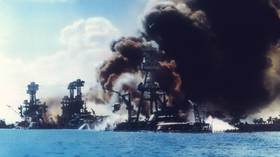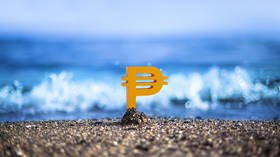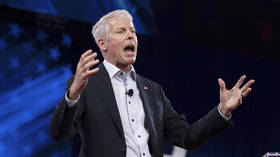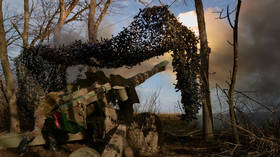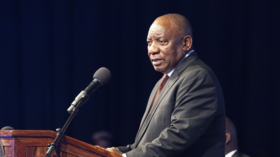What made Pearl Harbor inevitable
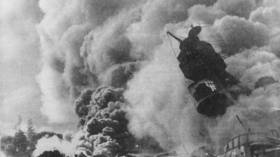
The surprise Japanese attack on the US fleet anchored at Pearl Harbor on December 7, 1941 was a tactical victory but a strategic defeat, clearing the way for US entry into WWII. History teaches that it was inevitable, but was it?
Over 2,400 Americans died that Sunday morning as the 1st Air Fleet of the Imperial Japanese Navy, the dreaded Kido Butai, struck the Pacific Fleet at anchor on the Hawaiian island of Oahu. One US battleship, the Arizona, was destroyed outright. Another, the Oklahoma, damaged beyond repair. Six others were severely damaged. Most of the US airplanes were destroyed on the ground. At first glance, “a date which will live in infamy” was a massive tactical victory for the IJN, on par with the triumphs against China in 1895 and Russia in 1905.
It was also a strategic disaster. The port facilities at Pearl were left largely intact, so the US was able to rebuild and salvage most of the stricken ships. The US aircraft carriers were elsewhere, meaning they survived to fight another day. Just six months later, three of them would wipe out the Kido Butai at Midway.
More importantly, the attack provided President Franklin Delano Roosevelt with a rallying cry. He had been eager to get the US involved in the war in Europe, creating a “Lend-Lease” program in March 1941 to supply the UK and later the USSR with weapons, and signing the Atlantic Charter with British PM Winston Churchill in August. The vocal domestic opposition he faced from Americans unwilling to repeat Woodrow Wilson’s WWI adventure vanished overnight after Pearl Harbor.
In recent years, there has been a renewed interest in “alternate history,” such as the hypothetical world of Philip K. Dick’s “The Man in the High Castle” – adapted in a popular Amazon series – that depicted the US partitioned between Germany and Japan after losing WWII. In that world, however, FDR had been assassinated in 1933 and Pearl Harbor never happened because it didn’t need to: the US had stayed out of the war until Germany and Japan got strong enough to invade outright.
Churchill himself dabbled in alt-history back in the 1930s, writing a notable account of a Confederate victory in the American Civil War. The Japanese decision to attack the US in 1941, however, doesn’t often get the alt-history treatment, because it seems inevitable given the circumstances. Far more is said every August, in debates on whether the US really needed to drop nuclear bombs on Hiroshima and Nagasaki, presented at the time as revenge for Pearl Harbor.
Ever since it was forcibly brought out of self-isolation in 1853 by US warships, Imperial Japan’s worldview was summed up by the expression “jakuniku kyoshoku”: “The weak are meat, the strong eat.” Japan modernized and became an imperial power in its own right, winning wars first against China, then against Russia. During WWI, Japan sided with the UK and later the US, picking off German colonies in the Pacific. In the 1930s, it created a client state in Manchuria and invaded China. In July 1941, however, FDR reacted to the Japanese occupation of French colonies – including what would later become Vietnam – by imposing sanctions. Japanese property in the US was seized and Tokyo hit with an oil embargo. Deprived of nearly 90% of the oil needed for their war machine, Japan could either back off or double down.
The US knew all too well about the Japanese naval doctrine of “Kantai Kessen,” decisive fleet action. Historical precedents existed, too, in the 1904 attack on Russian ships in Port Arthur, and the battleship engagement at Tsushima.
The British carrier attack against Italian battleships in Taranto in November 1940, which crippled the Regia Marina for the rest of the war, should have been instructive as well. The Japanese certainly took notes and applied the lessons to their strike on Pearl. The Americans did not. It is possible the attack itself could have unfolded otherwise if they had. US intelligence even had reports of an impending Japanese attack, but official history maintains they never reached Hawaii on time, due to bureaucratic error.
Scholars have suggested a Japanese strike on the Philippines might not have stirred up as much American anger, and that’s probably true. But the US fleet was not in Manila, but at Pearl. According to Japanese reasoning – which badly misunderstood both FDR’s war ambitions and American public opinion – war against the US simply wasn’t winnable unless they could knock out the Pacific Fleet in a decisive strike.
By the time Admiral Chuichi Nagumo was given the order to “climb Mount Niitaka,” the die was already cast. There were still things that could have changed the course of history, however. Had the US carriers stayed in port and been caught in the attack, that would have hurt the Pacific Fleet far more than the loss of the battleships. Nagumo could have also struck the port facilities – but had instead retreated, reportedly fearing the missing US carriers would launch a counterattack.
The last turning point that could have set history on a different course came on December 11, when Adolf Hitler declared war on the US. The decision was baffling, as Japan had chosen to stay neutral when Nazi Germany invaded the Soviet Union in June that year. Nor did FDR mention Germany, when he thundered to Congress on December 8 about the “treachery” of Japan.
On December 5, just two days before the Kido Butai struck Pearl, the Soviets had stopped the Nazi war machine at the gates of Moscow. From that point on, neither Japan nor Germany had any hope of actually winning the war, regardless of whether the US got overtly involved – though that wouldn’t become apparent until much later.
In attacking Pearl Harbor 80 years ago, the Japanese military junta had hoped to create an empire spanning the Pacific. In the end, they succeeded – except such an empire turned out not to be theirs.
The statements, views and opinions expressed in this column are solely those of the author and do not necessarily represent those of RT.

